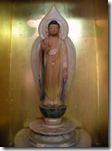Time and existence are as important for Buddhists as for anyone else. But the Buddhist idea about time and existence is different to most other ways of thinking about them. In general, we tend to think of time and existence as two separate things. I know I do anyway. Time is one thing, and existence or reality or whatever you like to call it is something else. The Buddhist idea isn’t like that though. Buddhism says that time and existence are two ways of talking about the same thing, they’re not separate from each other.
A while back, before he entered hospital, Gudo Nishijima sent me a copy of an email he wrote to someone who asked him about this.
The question was:
I read the chapter Uji (Existence and Time) in Master Dogen’s book Shobogenzo. In the chapter Master Dogen said:
''It is a complete realization that the whole of time is what the whole of existence is, and that there is nothing more than this''.
When he writes that, is he talking about the existence of a human being or about the existence of the Universe? If he’s referring to the whole existence of the Universe in that statement, it means that even the Universe is not limitless and consequently is dependent on time?
Gudo Nishijima’s answer was:
Master Dogen doesn’t say anything about the existence of a human being or the existence of the Universe in that statement. He says that existence and time are absolutely related with each other.
Master Dogen insists that without existence, time can not exist, and without time, existence can not exist at all. In other words, he insists that without existence, time never exists, and without time, existence never exists.
Therefore we should think that existence and time are very much related with each other. So it’s impossible to think about existence without thinking about time, and it’s impossible to think about time without thinking about existence.
Existence and time should be considered together, and it might not make sense to consider the question of existence and time without thinking about them like that.
Master Dogen clearly insists such opinion.
Gudo Wafu Nishijima
It’s only a small point in some ways, but that’s the Buddhist idea about existence and time. That’s why you sometimes hear people talking about “being here and now”. “Here” is the existence side, and “now” is the time side. And even though people use that phrase to describe feeling really present in the moment and focused on what’s happening right now and nothing else, actually the phrase “being here and now” applies to everyone. To you and me and all the folks in the neighborhood. And it’s like that right throughout our lives. There’s no other way. The only place we can ever be is where we are at each moment. So in a way it’s not a big deal. It’s the same for everyone.
What happens to most of us, though, is that our thoughts distract us from where we are and what we’re doing. So instead of focusing on slicing the veggies, we’re thinking about what happened a couple of weeks back when we saw those dancing elephants in Iceland. Or maybe we think about how great things would be if we could manage to get a nice job in London… We all know how it goes. We’re doing something that we’re not too excited about and our mind is drifting off somewhere else.
This is something you’ll notice if you do meditation. You’ll be sitting there on the cushion, and your mind will be going all over the place. That’s what happens to me anyway. When I do meditation, very little is happening outwardly, I’m literally just sitting there. But my mind can get really active imagining all sorts of different scenarios about different things or dreaming about all kinds of experiences that are never going to happen. But if you sit there for a while, gradually your mind starts to settle down all by itself, and during the meditation you can notice that, hey, you’re just sitting on the cushion doing your meditation. That’s basically “being here and now”. It’s not a big deal, and in a way it’s very simple, but it’s kind of a nice thing to notice too.
And when you get up off the cushion, that “being here and now” might stay with you for a while, and you might notice that being here and now isn’t so bad after all. The only thing about it is that even though people can write and talk about it, “being here and now” isn’t really something we can leave to our imagination. It’s something we have to experience for ourselves. That might sound difficult, because sometimes when we hear words like “being here and now”, it sounds like it must be something really intense that’s very faraway from where we are at the particular time. But actually it’s not like that. You’re already experiencing it. It’s just a matter of noticing, or maybe not noticing, it.
When I used to talk to Gudo Nishijima about this kind of thing, he used to say something like “we are enjoying the present moment”. It sounds really simple, and in many ways it is, but a lot of times we get dragged away by our thoughts of somewhere else or some other time and miss out on the things that are happening right in front of us. Doing meditation helps us to notice that.
So if you’re looking for a way to enjoy the present moment a bit more, you know what to do. And figuring out where and when to do it is easy too, right?




